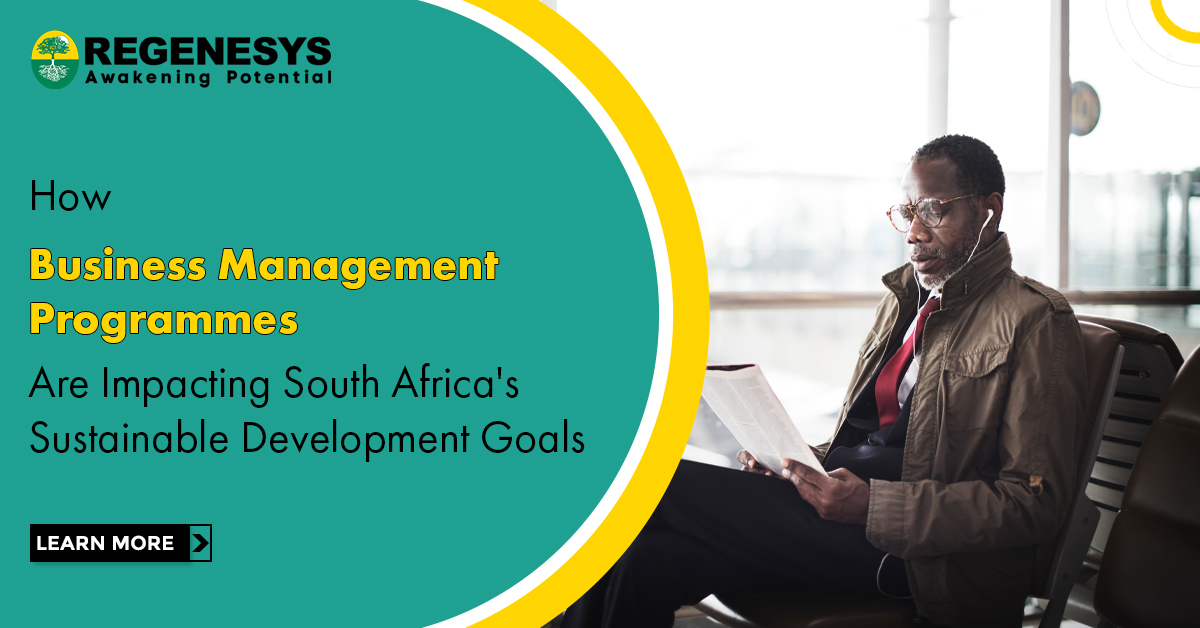South Africa is striving towards achieving its sustainable development goals (SDGs) as set out by the United Nation’s 2030 Agenda. To meet these ambitious targets, there must be a sustained effort from all sectors of society. This includes incorporating business management programmes that can actively shape policies and influence decision-making.
Business management programmes are essential in achieving South Africa’s sustainable development goals (SDGs). In this article, let us explore how business management programmes and curriculums help support these objectives locally and globally.
Table of Contents
What are Sustainable Development Goals?
The Sustainable Development Goals (SDGs) are 17 global goals adopted by all United Nations Member States in 2015 as part of the 2030 Agenda for Sustainable Development.
The Sustainable Development Goals (SDGs) are a universal call to action to end poverty, protect the planet, and ensure that everyone enjoys peace and prosperity. The goals are interconnected and address various economic, social, and environmental development aspects. They provide a shared blueprint for a better and more sustainable future.
Here are the 17 Sustainable Development Goals:
- No Poverty (SDG 1)
- Zero Hunger (SDG 2)
- Good Health and Well-being (SDG 3)
- Quality Education (SDG 4)
- Gender Equality (SDG 5)
- Clean Water and Sanitation (SDG 6)
- Affordable and Clean Energy (SDG 7)
- Decent Work and Economic Growth (SDG 8)
- Industry, Innovation, and Infrastructure (SDG 9)
- Reduced Inequality (SDG 10)
- Sustainable Cities and Communities (SDG 11)
- Responsible Consumption and Production (SDG 12)
- Climate Action (SDG 13)
- Life Below Water (SDG 14)
- Life on Land (SDG 15)
- Peace, Justice, and Strong Institutions (SDG 16)
- Partnerships for the Goals (SDG 17)
The Sustainable Development Goals (SDGs) are designed to address the most pressing challenges facing the world today and are intended to be achieved by 2030. They provide a framework for collaborative efforts among governments, businesses, civil society, and individuals to create a more sustainable and equitable world.
What are Business Management Programmes?
Business management programmes are educational programmes that focus on developing knowledge and skills related to the principles and practices of managing and leading organisations.
Business management programmes prepare individuals for leadership roles in various business settings. Business management programmes’ specific content and structure can vary, but they typically cover various topics relevant to effective organisational management.
Business management programmes are often offered worldwide at universities, colleges, or business schools.
Business management programmes often cover fundamental business disciplines, including finance, marketing, operations, and human resources. This foundational knowledge provides students with a holistic understanding of how businesses operate.
Business management programmes can lead to various academic degrees, including bachelor’s, master’s, and doctoral degrees. The level of depth and specialisation increases as students progress through these programmes. The ultimate goal is to equip individuals with the knowledge and skills necessary to navigate the complexities of the business world and contribute to the success and sustainability of organisations.
The Role of Business Management Programmes in South Africa’s Sustainable Development Goals.
Business management programmes are crucial in advancing South Africa’s Sustainable Development Goals (SDGs) by contributing to economic growth, social development, and environmental sustainability.
Here are several ways in which business management programmes can impact and align with South Africa’s SDGs:
Education and Awareness:
- Business management programmes can incorporate SDGs into their curricula to raise awareness among future business leaders about the importance of sustainable development.
Innovation and Entrepreneurship:
- Business management programmes can foster innovation and entrepreneurship that address sustainable development challenges.
- Encouraging students to develop businesses that align with SDGs can lead to the creation of solutions to societal and environmental issues.
Corporate Social Responsibility (CSR):
- Business management programmes can emphasise the integration of CSR principles into business practices. This includes:
- Promoting ethical business behaviour,
- Responsible supply chain management and
- Community engagement to contribute to social and environmental well-being.
Skills Development:
- Equip students with skills relevant to sustainable development, such as:
- Sustainable finance,
- Environmental management, and
- Social impact assessment.
- This ensures that graduates are well-prepared to contribute positively to the economy while minimising negative impacts.
Partnerships and Collaboration:
- Facilitate partnerships between businesses, government agencies, and non-profit organisations to work collaboratively toward achieving the SDGs.
- Business management programmes can serve as catalysts for creating networks that promote sustainable development.
Resource Efficiency and Circular Economy:
- Integrate principles of resource efficiency and the circular economy into business management education.
- This involves teaching students how to design and manage systems that minimise waste, promote recycling, and optimise resource use.
Financial Inclusion and Poverty Alleviation:
- Business management programmes can address SDG 1 (No Poverty) by focusing on initiatives that promote financial inclusion and economic development, aiming to lift people out of poverty through sustainable business practices.
Global Supply Chain Sustainability:
- Emphasise the importance of sustainable supply chain management, ensuring that businesses operate ethically and responsibly, both locally and globally.
- This can contribute to SDGs related to responsible consumption and production (SDG 12).
Technology for Development:
- Integrate the use of technology for sustainable development into business management education.
- This includes understanding how digital innovation can be harnessed to address social and environmental challenges.
Policy Advocacy:
- Equip business management students with the skills and knowledge needed for policy advocacy.
- This can involve encouraging sustainable business practices and influencing policies that support South Africa’s progress toward the SDGs.
Business management programmes can act as crucial drivers for sustainable development in South Africa by shaping the mindset and practices of future business leaders, fostering innovation, and promoting responsible business conduct that aligns with the country’s SDGs.
Conclusion
Business management programmes are pivotal in driving South Africa’s sustainable development goals by equipping future leaders with the knowledge and skills to promote sustainable business practices. By fostering a culture of responsible and ethical business conduct, these programmes contribute to the nation’s overall well-being, helping build a sustainable future for generations.
Stay tuned with Regenesys Business School to explore “The Role of Business Management Programmes in South Africa’s Sustainable Development Goals.”
Click here to learn more about Regenesys Business Schools’ business management degree, business management programme requirements and more.
The Role of Business Management Programmes in South Africa – FAQ’s
What is the importance of Sustainable Development?
Sustainable development is essential for the long-term well-being of a nation, encompassing economic, social, and environmental aspects. In South Africa, achieving sustainable development is imperative for addressing poverty, inequality, and environmental degradation.
What is Business Management?
Business management programmes in South Africa are designed to foster a deep understanding of sustainable business practices. This includes integrating principles of corporate social responsibility, environmental stewardship, and ethical business conduct into everyday operations.
What is the objective of Business management programmes?
Business management programmes aim to cultivate sustainable leadership by nurturing a mindset that values long-term economic, social, and environmental sustainability.
What are the outcomes of Business management programmes?
Business management programmes prepare individuals to lead and influence teams within an organisation. On completing this programme, graduates are equipped to lead organisations holistically, considering the impact of business decisions on all stakeholders and the environment.








